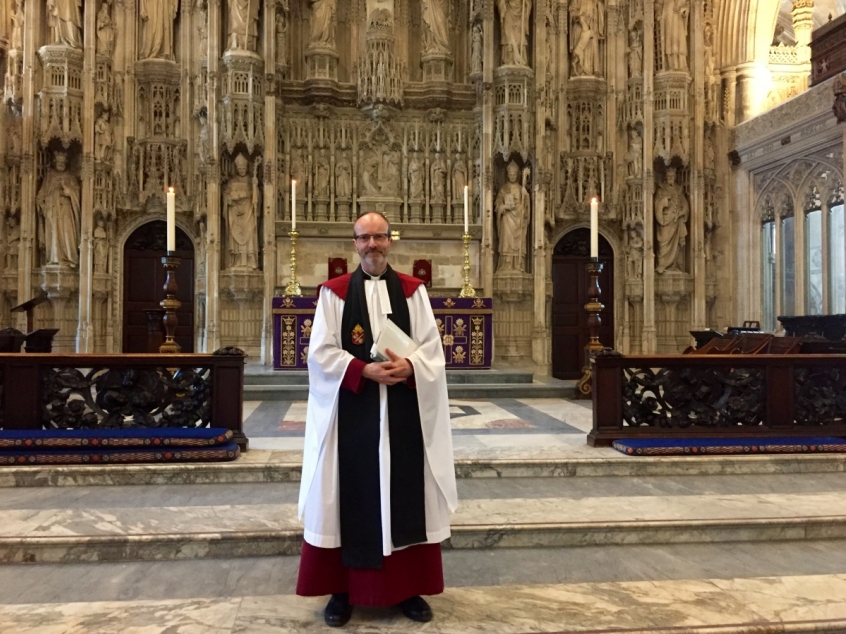
What must we do and what must we stop doing to escape from bondage to our basest desires, from being held captive by powers quite beyond our control and from being lost in a cycle of anger and desolation?
As the Bible puts it, by ourselves we are left 'following the course of this world, following the ruler of the power of the air ... All of us once lived among them in the passions of our flesh and senses, and we were by nature children of wrath.'
It's good sometimes to see the mud in which we stand without God, even when those who choose our lectionary readings choose to start them where things begin to cheer up; but we must start with the extreme, for a very good reason named Khalid Masood - the man responsible for the London terror attack last week.
Masood started life as normal as anyone else, but ended up going to London to perform an unspeakable act of multiple murder, having at some point been radicalised, perhaps while in prison for his violent crimes. Beyond the shock we feel that something like this can happen, we need to seek a radical alternative to terror, if we are to find hope for society.
The think-tank Theos recently published a report called Doing Good, which begins with an analysis of the state of religion in Britain.
In spite of a steep decline in nominal belief, religion is much talked about today, perhaps because of its capacity to shake the status quo. Radicalisation is absurd and unaccountable. We know that it can wrench people from their normal homes, families and careers in a matter of weeks. Somehow or other it must be pressing a button deep in the soul, offering relief and release to some higher cause and purpose. We're told that minutes before his attack Masood was laughing and joking.
Radicalisation is reasonable and even joyful if you start to believe that you have a calling to derail and destroy all that speaks of decadence and its symbols of so-called power. We can begin to imagine now what the Houses of Parliament looks like through the eyes of a terrorist and what the people who have come to gawp at it seem worth.
It's a tragic deceit and with everyone else I stand against it in outrage. But where is the true release from the mess, the mud, in which we stand?
Some us had the good fortune last week to hear Bishop of Winchester Tim Dakin giving us an overview of the Biblical story that places us in a meaningful universe. The key moment after creation begins is the Fall. The Fall happens when through their disobedience to God, Man and Woman are expelled from Paradise. It's a landmark because it reminds us again and again that our forgetfulness of God and our revolt against him has robbed us of our tranquillity and that we're searching for a way home.
Christianity offers a genuinely radical solution to our longings. It's not about self-repair or trying harder or about using violence to re-attain Paradise. It's about taking the misery of our condition without God absolutely seriously. We are really lost. We may be comfortable, but we are lost – dead in our trespasses, unable to master who we are, trapped and frustrated.
But we are not alone in that. God is with us, sharing our misery in Jesus Christ, though in his case without sin - without resorting to hate, anger or violence. He shares our very death, going meekly to his like a lamb to the slaughter. But when God vindicates Jesus, raising him from the grave, the gift of a graceful and merciful life is opened up to us.
We heard it in our reading: 'God, who is rich in mercy, out of the great love with which he loved us even when we were dead through our trespasses, made us alive together with Christ – by grace you have been saved – and raised us up with him and seated us with him in the heavenly places in Christ Jesus.'
The Christian vision is that we can be lifted from the mud and be made monarchs, rulers with him in a world restored by mercy. We can become authoritative agents of mercy. This is not of our own doing but is the calling we receive in Christ to become like him and to reign with him.
For a moment we should relish the poetic splendour of it. Because when people ask if there an escape from this sense of being bogged down or trapped that seems so much part of the human condition, we can say yes. There is a way of being raised up which is as radical, more radical, than anything else on offer. It's the path of being an ambassador of a just and merciful world – God's new creation.
And we do not do this by taking up arms and fighting for a cause by force. That is simply to take our passions and base desires and to project them onto the heavens. No, we must die completely to that way of being and live instead a new life, a radically different life of mercy, which belongs not to us but to Christ. It is his gift to us.
The prose of this new life in practice is good works. They are our calling. As it says, 'we are what he has made us, created in Christ Jesus for good works'. And chief among those good works, the letter to the Ephesians goes on to say, is the work of reconciliation.
There is a double radicalism here. There is radicalism about means – our means are peaceful and Christ-like. But our ends are different too. We do not aim to annihilate whatever is not us, but to be reconciled to it. The church is an experiment in reconciliation. Sometimes the experiment seems not to have got very far, but the point of church is that we are made one through faith in Christ alone and not by our being all alike.
What can the Church do then in a society which isn't very bothered to be associated with it, even nominally? The Church can be itself by being bothered with others, especially with those who need help – help in their weakness and sometimes help in their strength. There are a lot of people who are indifferent to 'religion', but very few who will turn their backs on mercy.
The church has no monopoly on mercy - we have all been heartened and moved by the kindness of those who went to help those stricken in Westminster – but the church is a place where we can affirm and encourage all that and, more, point towards the source of all mercy, Jesus Christ, who gives us a life which is merciful, through his resurrection from the dead.
The Christian faith is beautiful and humane, however hard it is to grasp in all its majesty, but tonight all we need to grasp is that it provides a complete antidote and antithesis to terror. It's a faith that cashes out in a thousand acts of kindness and care, and then a thousand more. This is Christ's abundance that we see on his journey to Jerusalem, healing and teaching all the way, in his arms open wide on the cross, accepting the penitent, and in his rising from the dead, kicking off the chains that bind us to our fear and baser passions.
The same impetus that causes us here and now to thirst for God in worship draws us to seek the good of others: we are radically incomplete and need to relate to the Other to find wholeness, whether that other is God or our neighbour.
But thank God for the gift of Jesus, who brings us a way to fill that empty space with love, who himself is that fullness of love.
Roland Riem is a Canon of Winchester Cathedral. This is an edited version of his sermon at Evensong on 26 March 2017













